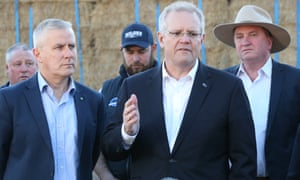While the Liberals may take some joy from the result in NSW, the poor
showing for the Nationals is set to inflame Coalition divisions and
leadership speculation
While the Liberals will emerge from the New South Wales
state election feeling less despondent about their federal prospects in
May than they felt before Saturday night, imagining a containment line
in Scott Morrison’s home state – the same can’t be said of the
Nationals.
The state jigsaw puzzle is a complex one, and still resolving, but it is clear the Liberals have managed to hold their ground in Sydney – doubtless helped by state Labor leader Michael Daley’s indefensible observation that “foreigners”, mainly Asians, were moving in and taking jobs from young Sydneysiders – a faceplant into deep stupid emblematic of what was by all accounts, a shocking final week for the Labor campaign.
But while the Liberals will feel more sanguine, people in the bush are clearly waiting with baseball bats – a gathering backlash that will rattle already rattled Nationals.
Queensland Nationals have already had one public pass at the federal leader, Michael McCormack, for failing to stand up to the Liberals on energy prices and new coal stations, and have only been holding their tongues this past week in order to not cause problems for their New South Wales colleagues.
With the votes now in in NSW, it’s reasonable to predict that plain
speaking will resume forthwith. Courtesy of Saturday night’s result,
federal Nationals see their once rusted-on vote leaking to the shooters
party, to independents and to One Nation, with their own electoral
judgment day just around the corner.The state jigsaw puzzle is a complex one, and still resolving, but it is clear the Liberals have managed to hold their ground in Sydney – doubtless helped by state Labor leader Michael Daley’s indefensible observation that “foreigners”, mainly Asians, were moving in and taking jobs from young Sydneysiders – a faceplant into deep stupid emblematic of what was by all accounts, a shocking final week for the Labor campaign.
But while the Liberals will feel more sanguine, people in the bush are clearly waiting with baseball bats – a gathering backlash that will rattle already rattled Nationals.
Queensland Nationals have already had one public pass at the federal leader, Michael McCormack, for failing to stand up to the Liberals on energy prices and new coal stations, and have only been holding their tongues this past week in order to not cause problems for their New South Wales colleagues.
The problem for the Coalition federally is the sorts of policy areas where the Nationals will want to pursue product differentiation will continue to cause friction with Liberals, who also need to sandbag in metropolitan areas.
Then there is the deeply fraught issue of preference deals with One Nation, which has caused significant political difficulties for Scott Morrison following the Christchurch attacks.
Morrison is under pressure to show leadership, and shun the fringe players, as an important gesture of social cohesion and moral clarity. But, given the strength of the regional protest vote, some Nationals will want to do deals with rightwing fringe parties, a dynamic which is deeply unhelpful for metropolitan Liberals who will want to project a more progressive face to their constituents.
A fresh round of contention between the Coalition partners in Canberra, if that’s what happens, will only reinforce perceptions of division and disunity, which further corrodes the government’s standing, because it tests the patience of voters tired of politics as a game of rolling self-obsession at taxpayer expense.
The different results in different parts of the state also underscores how difficult it is becoming for governments of the centre-right to reconcile differences between their metropolitan and regional constituencies, which is a bigger challenge to confront than how the cards fall in one or two election cycles.
Perhaps anticipating more lively times to come, leading Liberal moderate Trent Zimmerman, fronting the ABC’s election night coverage on Saturday night, advised Barnaby Joyce, who wants his old job back, to spend less time on the television and more time in Tamworth.
Good luck with that Trent.
In terms of the bigger picture, the NSW result is very different to last year’s Victorian state election, which saw the Labor incumbent, Daniel Andrews, returned to government, and with the protest vote against the Liberals flowing strongly to Labor.
The zeitgeist in New South Wales is surlier.
All of the major parties went backwards on Saturday night and, while the Liberal performance was better than the polls suggested, it’s not clear whether the state will be governed in majority or minority. The clear winners of the night were the protest movements, which is a tangible measure of the disengagement and disaffection in Australia’s most populated state.
It’s not at all certain that the state result translates federally either for the Liberals or for Labor, but Saturday night will give Liberals reason to hope that Labor is not currently storming to government in western Sydney or in the seats with significant ethnic diversity around the city that Bill Shorten will have already pencilled into his column come May.
Scott Morrison might even dare to hope that Shorten could come unstuck in the pressure of a campaign in the same way Daley did – although I think all the evidence to date suggests Daley wasn’t well-prepared, and Shorten relishes the campaign environment.
In summary: NSW is interesting, and material, but it doesn’t change the dynamic of the federal contest.
Both of the major parties know the result of the looming federal campaign will be determined by voters in Victoria and Queensland. Nothing fundamental has changed.

No comments:
Post a Comment